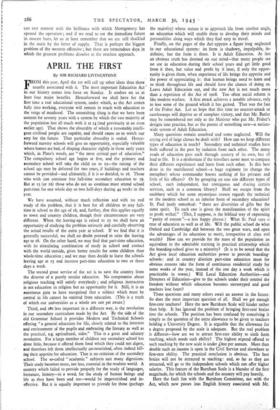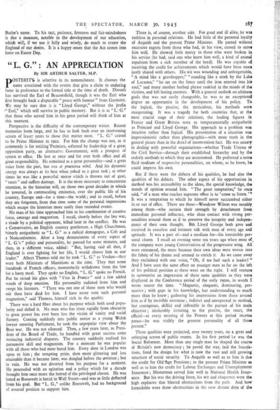APRIL THE FIRST
By SIR RICHARD LIVINGSTONE
FROM this year, April the 1st will call up other ideas than those usually associated with it. The most important Education Act• in our history comes into force on Sunday. It confers on us at least four major benefits. Henceforward we shall have for the first time a real educational system, under which, as the Act comes fully into working, everyone will remain in touch with education to the verge of manhood. The astonishing thing is that we have been content for seventy years with a system by which the vast majority of the population lost all touch with it at 14 (and previously at an even earlier age). That shows the absurdity of which a reasonably intelli- gent civilised people are capable, and should cause us to watch our step for the future. That particular absurdity is ended. Hence- forward nursery schools will give an opportunity, especially valuable where homes are bad, of shaping character rightly in those early years which, in Plato's words, are "the most critical part of education." The compulsory school age begins at five, and the primary and secondary school will take the child on to 15—the raising of the school age may be deferred for two years, if buildings and teachers cannot be provided—and ultimately, if it is so decided, to 16. Those who wish can continue free full-time secondary education to 19. But at 15 (or 16) those who do not so continue must attend school part-time for one whole day or two half-days during 44 weeks in the year.
We have assumed, without much reflection and with no real study of the problem, that it is best for all children to stay full- time at school to the age of 16, and, further, that this applies equally to town and country children, though their circumstances are very different. When the leaving-age is raised to 15 we shall have an opportunity of studying the problem seriously and carefully observing the actual results of the extra year at school. If we find that it is generally successful, we shall no doubt proceed to raise the leaving age to 16. On the other hand, we may find that part-time education, with its stimulating combination of study in school and contact with the world outside, gives better results for some children than whole-time education ; and we may then decide to leave the school.. leaving age at 15 and increase part-time education to two or three days a week.
The second great service of the act is to save the country from the disaster of a purely secular education. No compromise about religious teaching will satisfy everybody ; and religious instruction is not education in religion but an opportunity for it. Still, it is an enormous gain to have recognised that a subject which must be central in life cannot be omitted from education. (This is a truth of which our universities as a whole are not yet aware.) Third, and net less important in a different way, is the revolution in our secondary curriculum made by the Act. By the side of the old Grammar School it provides Modern and Technical Schools offering "a general education for life, closely related to the interests and environment of the pupils and embracing the literary as well as the practical, e.g. agricultural, sides." This is a great and salutary revolution. For a'large number of children our secondary school has done little, because it offered them food which they could not digest, and therefore left them intellectually un-nourished, often indeed kill- ing their appetite for education. That is no criticism of the secondary school. The so-called " academic " subjects suit many digestions. Their study becomes more, not less, essential in the modern world. A country which failed to provide properly for the study of languages, literature, history—in a word, for the study of human beings and life as they have been and are—would be impoverished and in- effective. But it is equally important to provide for those (perhaps the majority) whose nature is to approach life from another angle, an education which will enable them to develop their minds and personalities along ways which they find easy to travel.
Finally, on the pages of the Act- appears a figure long neglected in our educational system: its form is shadowy, impalpable, in- definite, but the form is there. It is Adult Education. At last an obvious truth has dawned on our mind—that many people see no use in education during their school years and get little good from it then, but value and profit by it later, if only the oppor- tunity is given them, when experience of life brings the appetite and the power of appreciating it: that human beings need to learn and to think throughout life and should have the chance of doing so.
Leave Adult Education out, and the new Act is not much more than a repetition of the Act of 1918. Too often social reform is like modern warfare. A first attack achieves a notable advance, only to lose some of the ground which it has gained. That was the fate of the Fisher Act. Let us hope that this time no counter-attack or carelessness will deprive us of complete victory, and that Mr. Butler may be remembered not only as the Minister who put Mr. Fisher's designs into practice, but as the parent of something new—a nation- wide system of Adult Education.
Many questions remain unsolved and some neglected. Will the crying evil of large classes be dealt with? How can we keep different types of education in touch? Secondary and technical studies have both suffered in the past by isolation from each other. The many roads of education pass each through scenery of its own, but all lead to life. It is a misfortune if the travellers never meet to compare their different experiences and learn from each other. Is this best done in the multilateral school—a huge regiment (to change the metaphor) whose commander knows nothing of his privates and little of his officers? Or by grouping on one site different types of school, each independent, but contiguous and sharing certain services, such as a common library? Shall we escape from the snobbery which for some Mysterious reason regards the technical or the modern school as an inferior form of secondary education? St. Paul justly remarked : "there are diversities of gifts but the same spirit. To each one is given the manifestation of the spirit to profit withal." (This, I suppose, is the biblical way of expressing "parity of esteem "—a less happy phrase.) What St. Paul says is true of education as well as of life. Will the public school do what Oxford and Cambridge did between the two great wars, and open the advantages of its education to merit, irrespective of class and wealth? How can we provide for the mass of the population an equivalent to the admirable training in practical citizenship which the boarding-school gives to a minority? (It is to be noted that the Act gives local education authorities power to provide boarding- schools: and in country districts part-time education must for obvious reasons take the form of continuous residential study for some weeks of the year, instead of the one day a week which is practicable in towns.) Will Local Education Authorities—and Directors of Education—give to the schools under their control the freedom without which education becomes stereotyped and good teachers lose heart?
These questions and many others await an answer in the future. So does the most important question of all. Shall we get enough first-rate teachers? Here the new Burnham Scale will hinder rather than help. It has ignored the problem of bringing first-rate brains into the schools. The position has been confused by conceiving it simply as the question of the extra allowance to be given to teachers holding a University Degree. It is arguable that the allowance for a degree proposed by the scale is adequate. But the real problem is different—how are we to attract first-rate ability to sixth form teaching, which needs such ability? The highest stipend offered to such teaching by the new scale is under Low per annum. More than double such an income is open in the Civil Service and elsewhere to first-rate ability. The practical conclusion is obvious. The best brains will not be attracted to teaching: and, so far as they are attracted, will go to the independent schools which can offer higher salaries. This feature of the Burnham Scale is a blunder of the first magnitude, for which the schools and the country will pay heavily.
Here the fault lies with the Burnham Committee, not with the Act, which now passes into English history associated with Mr. Butlees name. To his tact, patience, firmness and fair-mindedness is due a measure, notable in the development of our education, which will, if we use it fully and wisely, do much to create the England of our desire. It is a happy omen that the Aot comes into force on Easter Day.























 Previous page
Previous page